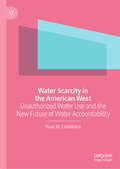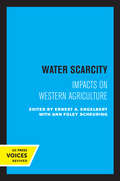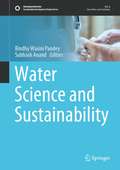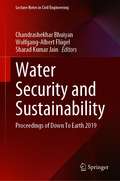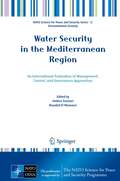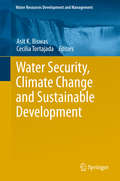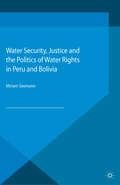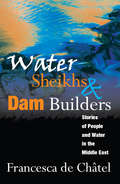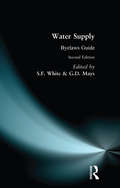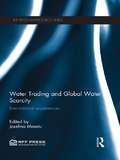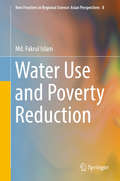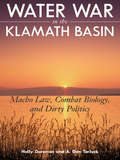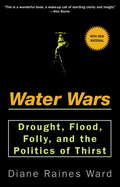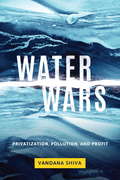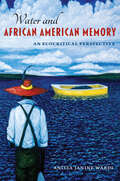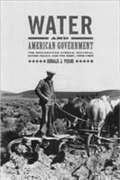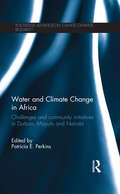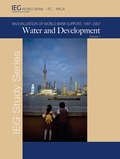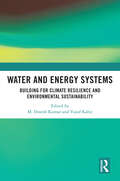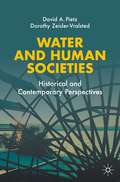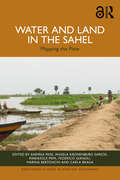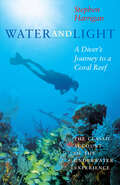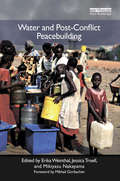- Table View
- List View
Water Scarcity in the American West: Unauthorized Water Use and the New Future of Water Accountability
by Isaac M. CastellanoThis book examines the role of unauthorized water use in the American West (Arizona, California, Colorado, Idaho, Montana, Nevada, New Mexico, Oregon, Utah, Washington, and Wyoming) and the coming demand for water accountability. Arguing that status quo responses to unauthorized water use (or water theft) and the protection of water rights are largely inadequate, this title examines the far-ranging impacts of this lackluster response on issues ranging from food production to urban livability, and concludes that there will be intense pressure at both the federal and state level to address these issues. Utilizing qualitative and quantitative models and collaborative management literature to identify ideal approaches, this project ultimately seeks to address this major crisis of states’ legitimacy and analyze potential solutions under the ever-expanding threat of climate change.
Water Scarcity: Impacts on Western Agriculture
by Ernest A. Engelbert Ann Foley ScheuringAgricultural production in the semi-arid western United States is dependent on irrigation. Population in the seventeen western states has been and is expected to continue increasing. Groundwater levels are declining throughout the region with long-term pumping and increased demands leading to greater pumping lifts and costs, land subsidence, and salt water intrusion into groundwater basins. Construction and operation costs of future water development in these states will be great, both in dollars and in economic and social effects. Competition for the available water supply due to increased demands in both agricultural and non-agricultural sectors continues to increase. Although considerable attention has been given to some aspects of declining water supplies for irrigated agriculture in particular areas, this is the first volume to adress in a comprehensive manner the effects of scarce water supplies on agricultural production and the resultant impacts at regional, state, national, and international levels. Over seventy experts, representing all the major physical and social sciences as well as industries examine the issues and conclude that important decisions must be made at all levels of government and private enterprise if the prosperity and quality of life in the region are to be maintained. Specific technical, economic, institutional, and managerial solutions are recommended to forestall an impending water crisis. All segments of society--agriculturalists, urbanites, food processors, land developers, environmentalists, and others--have major stakes in the outcome of any action for future water supplies and distribution in the West. This title is part of UC Press's Voices Revived program, which commemorates University of California Press's mission to seek out and cultivate the brightest minds and give them voice, reach, and impact. Drawing on a backlist dating to 1893, Voices Revived makes high-quality, peer-reviewed scholarship accessible once again using print-on-demand technology. This title was originally published in 1984.
Water Science and Sustainability (Sustainable Development Goals Series)
by Subhash Anand Bindhy Wasini PandeyThis book describes the importance of water resources for socio-economic and ecological development including geomorphic and ecological environments. Hence, conservation, management and development of water resources have become necessary for the all-around development of global populations and the environment. It is the outcome of valuable contributions made by eminent scientists and research scholars who have developed alternative strategies, solutions and models for sustainable water resources through research, monitoring and experiments varying from regional to global scale. This book is of immense use to the policymakers, environmentalists, ecologists, academician, research scholars and people in general concerned with water resources management.
Water Security and Sustainability: Proceedings of Down To Earth 2019 (Lecture Notes in Civil Engineering #115)
by Wolfgang-Albert Flügel Chandrashekhar Bhuiyan Sharad Kumar JainThis book contains selected peer-reviewed papers presented in the International Conference Down To Earth 2019, and is focused on Water Security and Sustainability. The topics covered in this book include sustainability of water resources, geospatial modelling and hydro-informatics, extreme hydrology (drought and flood), adaptation to climate-change impacts, vulnerability-risk-reliability-resilience, and hydrological risks in north-east India. The book also discusses innovative techniques and technologies for water resources assessment and management. Enriched with numerous case studies covering diverse topics, the book can be valuable for students, researchers, as well as industry professionals interested in water resources assessment, management and sustainable development.
Water Security in the Mediterranean Region
by Andrea Scozzari Bouabid El MansouriThe role of water in our communities, from local to regional and right up to global levels, poses a series of key questions about climate change, about the anthropogenic impact on the environment, and about all the interconnected actions and events that affect the availability and quality of the resource. All these questions share a common demand for more scientific knowledge and information. In this particular context the disciplinary boundaries are fading, and there is a growing need to create broader connections and wider collaborative interdisciplinary groups, aimed at building an integrated knowledge-base to serve not only stakeholders but also the whole of society. Only in this way can we hope to respond effectively to the challenges and changing dynamics of human-hydrologic systems. Following this concept, contributors from multiple disciplinary backgrounds, such as Law Studies, Hydrogeology, Monitoring and Information Technologies, Geophysics, Geochemistry, Environmental Sciences, Systems Engineering, Economics and Social Studies, joined forces and interacted in this workshop. The present book reports the proceedings of this three-day ARW (Advanced Research Workshop), and explores different aspects of the environmental security assessment process, focusing on the assessment, monitoring and management of water resources, and giving an overview of the related scientific knowledge.
Water Security, Climate Change and Sustainable Development
by Asit K. Biswas Cecilia TortajadaThis book pursues a comprehensive approach so as to arrive at a better understanding of the implications of climate change on sustainable development, focusing on the perspective of water. Climate change is one of today's most pressing global issues and will become increasingly important in the decades to come, as societies will feel its pervasive impacts in many aspects of their lives. Given that the majority of these climate change impacts will be felt through the medium of water, the book explores the interrelationships and inter-linkages between water, climate change and sustainable development.
Water Security, Justice and the Politics of Water Rights in Peru and Bolivia (Environment, Politics And Social Change)
by Miriam SeemannWater Security, Justice and the Politics of Water Rights in Peru and Bolivia.
Water Security, Justice and the Politics of Water Rights in Peru and Bolivia (Environment, Politics and Social Change)
by Miriam SeemannThe author scrutinizes the claim of policy-makers and experts that legal recognition of local water rights would reduce water conflict and increase water security and equality for peasant and indigenous water users. She analyzes two distinct 'top-down' and 'bottom-up' formalization policies in Peru and Bolivia - neoliberal the former, indigenist-socialist the latter. The policies have intended and unintended consequences and impact on marginalized peasants and the complex inter-legal systems for providing water security on the ground. This study seeks to debunk the official myth of the need to create state-centric, top-down legal security in complex, pluralistic water realities. The engagement between formal and alternative 'water securities' and controversial notions of 'rightness' is interwoven and contested; a complex setting is unveiled that forbids one-size-fits-all solutions. Peru's and Bolivia's case studies demonstrate how formalization policies, while aiming to enhance inclusion, in practice actually reinforce exclusion of the marginalized. Water rights formalization is certainly no panacea.
Water Sheikhs and Dam Builders: Stories of People and Water in the Middle East
by Francesca de ChatelFrancesca de Chatel explores the problems and paradoxes of water resources in the Middle East and North Africa. She takes an entirely new angle on the much-discussed question of water scarcity by examining the history and culture of water from a human perspective. Unlike other books on the subject that provide specialized geopolitical, economic, and hydrological analyses, this book presents the reality of water scarcity through the eyes of those confronting the problem on a daily basis.The author provides a colorful and diverse portrait of a resource that is inextricably entwined with the history and future of the region and its peoples. Using research obtained in her travels, she combines lively character sketches, interviews, travel descriptions, historical anecdotes, and hard facts to reveal the complexity of this invaluable resource.Besides identifying the causes of the current water crisis, the book also discusses the reason for a lack of awareness among the general public, and deals with a variety of themes: the role of water in religions and ideologies, the impact of large-scale water projects on people's perception of the resource, and the politics of water pricing. In exploring the past, present, and future of water in the region, de Chatel exposes the roots of the current water crisis.
Water Supply Byelaws Guide
by S. F. White G. D. MaysFirst published in 1990. Routledge is an imprint of Taylor & Francis, an informa company.
Water Trading and Global Water Scarcity: International Experiences (RFF Press Water Policy Series)
by Josefina MaestuWater scarcity is an increasing problem in many parts of the world, yet conventional supply-side economics and management are insufficient to deal with it. In this book the role of water trading as an instrument of integrated water resources management is explored in depth. It is also shown to be an instrument for conflict resolution, where it may be necessary to reallocate water in the context of increasing scarcity. Recent experiences of implementation in different river basins have shown their potential as instruments for improving allocation. These experiences, however, also show that there are implementation challenges and some limitations to trading that need to be considered. This book explores the various types of water trading formulas through the experience of using them in different parts of the world. The final result is varied because, in most cases, trading is conditioned by the legal and institutional framework in which the transactions are carried out. The role of government and the definition of water rights and licenses are critical for the success of water trading. The book studies the institutional framework and how transactions have been undertaken, drawing some lessons on how trading can improve. It also analyses whether trading has really been a positive instrument to manage scarcity and improve water ecosystems and pollution emission problems in those parts of the world which are most affected. The book concludes by making policy proposals to improve the implementation of water trading.
Water Use and Poverty Reduction
by Md. Fakrul IslamThis book is the outcome of empirical research on the sharing of water of the Teesta River, which flows through India and Bangladesh. The main purpose is to show how regional cooperation between India and Bangladesh regarding sharing of Teesta River water can ensure optimal benefits for people living in the area of the Teesta Basin located in the two countries. The author takes an interdisciplinary approach focusing on the relationship between availability of water and the reduction of poverty in the Teesta Basin as a whole. The book presents findings of a comparative socioeconomic survey on the Dalia and Gazoldoba irrigable areas, with background information on the Teesta River and its origin, spatio-physical nature, geomorphic and hydrological characteristics, irrigation and water delivery system through the Gazoldoba barrage in India and the Dalia barrage in Bangladesh. Citing the principles of transboundary freshwater sharing, this work focuses on different approaches to international water sharing and introduces an optimal approach to dry season water sharing and welfare maximization by developing a bilateral water sharing model. The model is tested through computer simulation, and an alternative water allocation policy is proposed. Water Use and Poverty Reduction is highly recommended to readers who seek an optimum solution to transboundary and bilateral water sharing and poverty reduction issues.
Water War in the Klamath Basin: Macho Law, Combat Biology, and Dirty Politics
by A. Dan Tarlock Holly D. DoremusIn the drought summer of 2001, a simmering conflict between agricultural and environmental interests in southern Oregon's Upper Klamath Basin turned into a guerrilla war of protests, vandalism, and apocalyptic rhetoric when the federal Bureau of Reclamation shut down the headgates of the Klamath Project to conserve water needed by endangered species. This was the first time in U.S. history that the headgates of a federal irrigation project were closed--and irrigators denied the use of their state water rights--in favor of conservation. Farmers mounted a brief rebellion to keep the water flowing, but ultimately conceded defeat. In Water War in the Klamath Basin, legal scholars Holly Doremus and A. Dan Tarlock examine the genesis of the crisis and its fallout, offering a comprehensive review of the event, the history leading up to it, and the lessons it holds for anyone seeking to understand conflicts over water use in the arid West. The authors focus primarily on the legal institutions that contributed to the conflict--what they call "the accretion of unintegrated resource management and environmental laws" that make environmental protection so challenging, especially in politically divided regions with a long-standing history of entitlement-based resource allocation. Water War in the Klamath Basin explores common elements fundamental to natural resource conflicts that must be overcome if conflicts are to be resolved. It is a fascinating look at a topic of importance for anyone concerned with the management, use, and conservation of increasingly limited natural resources.
Water Wars
by Diane Raines WardUpdated with new material Every day, we hear alarming news about droughts, pollution, population growth, and climate change--which threaten to make water, even more than oil, the cause of war within our lifetime. Diane Raines Ward reaches beyond the headlines to illuminate our most vexing problems and tells the stories of those working to solve them: hydrologists, politicians, engineers, and everyday people. Based on ten years of research spanning five continents, Water Wars offers fresh insight into a subject to which our fate is inextricably bound.
Water Wars
by Vandana ShivaAcclaimed author and award-winning scientist and activist Vandana Shiva lucidly details the severity of the global water shortage, calling the water crisis "the most pervasive, most severe, and most invisible dimension of the ecological devastation of the earth." She sheds light on the activists who are fighting corporate maneuvers to convert the life-sustaining resource of water into more gold for the elites and uses her knowledge of science and society to outline the emergence of corporate culture and the historical erosion of communal water rights. Using the international water trade and industrial activities such as damming, mining, and aquafarming as her lens, Shiva exposes the destruction of the earth and the disenfranchisement of the world's poor as they are stripped of rights to a precious common good. Revealing how many of the most important conflicts of our time, most often camouflaged as ethnic wars or religious wars, are in fact conflicts over scarce but vital natural resources, she calls for a movement to preserve water access for all and offers a blueprint for global resistance based on examples of successful campaigns. Featuring a new introduction by the author, this edition of Water Wars celebrates the spiritual and traditional role water has played in communities throughout history and warns that water privatization threatens cultures and livelihoods worldwide.
Water and African American Memory: An Ecocritical Perspective
by Anissa J. WardiWhile there is no lack of scholarship on the trans-Atlantic voyage and the Middle Passage as tropes in African diasporic writing, to date there has not been a comprehensive analysis of bodies of water in African American literature and culture.In Water and African American Memory, Anissa Wardi offers the first sustained treatise on watercourses in the African American expressive tradition. Her holistic approach especially highlights the ways that water acts not only as a metaphorical site of trauma, memory, and healing but also as a material site.Using the trans-Atlantic voyage as a starting point and ending with a discussion of Hurricane Katrina, this pioneering ecocritical study delves deeply into the environmental dimension of African American writing. Beyond proposing a new theoretical map for conceptualizing the African Diaspora, Wardi offers a series of engaging and original close readings of major literary, filmic, and blues texts, including the works of Toni Morrison, Ntozake Shange, Julie Dash, Henry Dumas, and Kasi Lemmons.
Water and American Government: The Reclamation Bureau, National Water Policy, and the West, 1902–1935
by Donald J. PisaniDonald Pisani's history of perhaps the boldest economic and social program ever undertaken in the United States--to reclaim and cultivate vast areas of previously unusable land across the country--shows in fascinating detail how ambitious government programs fall prey to the power of local interest groups and the federal system of governance itself.
Water and Climate Change in Africa: Challenges and Community Initiatives in Durban, Maputo and Nairobi (Routledge Advances in Climate Change Research)
by Patricia E. PerkinsIn the coming decades, countries around the world will face increasingly severe challenges related to global climate change. While the details vary from country to country, the impacts will be especially grave for marginalized people, whose access to food, potable water, and safe shelter may be threatened due to fluctuations in rainfall and temperature, and to extreme weather events. Because weather extremes are the main way that climate change manifests itself, water governance is a crucial aspect of climate change resilience. Following an overview of the ways climate change is affecting three cities in Africa, Water and Climate Change in Africa: Challenges and Community Initiatives in Durban, Maputo and Nairobi discusses the equity and climate justice implications, and then gives examples of ways in which a range of local community organizations are extending their current activities to address these challenges through innovative new programs and initiatives at the grassroots. This approach has implications for communities worldwide; it is a process of building on existing organizations’ aptitudes and strengths in the light of local knowledge of climate challenges, and creating partnerships to build equity-enhancing new methods of protecting people’s subsistence. This book should be of interest to climate change scholars, activists and policy-makers, as well as development studies researchers and practitioners.
Water and Development
by The World BankDevelopment patterns, increasing population pressure, and the demand for better livelihoods in many parts of the globe all contribute to a steadily deepening global water crisis. Development redirects, consumes, and pollutes water. It also causes changes in the state of natural water reservoirs, directly by draining aquifers and indirectly by melting glaciers and the polar ice caps. Maintaining a sustainable relationship between water and development requires that current needs be balanced against the needs of future generations. The development community has transformed and broadened its approach to water since the 1980s. As stresses on the quality and availability of water have increased, donors have begun to move toward more comprehensive approaches that seek to integrate water into development in other sectors. This evaluation examines the full scope of the World Bank's lending and grant support for water activities. More than 30 background papers prepared for the evaluation have analyzed Bank lending by thematic area and by activity type. IDA and IBRD (the Bank) have supported countries in many water-related sectors. The evaluation, by definition, is retrospective, but it identifies changes that will be necessary going forward, including those related to strengthening institutions and increasing financial sustainability. Lessons and results from nearly 2,000 loans and credits, and work with 142 countries are identified.
Water and Energy Systems: Building for Climate Resilience and Environmental Sustainability
by M. Dinesh Kumar and Yusuf KabirThis book addresses how water supply systems can be planned, designed, and managed for sustainability by presenting unique approaches and methodologies in rural drinking water supply schemes. It synthesizes the outcomes and findings of research studies undertaken by the Institute for Resource Analysis and Policy (IRAP) and pilot projects undertaken by RCUES (Regional Centre for Urban Environmental Studies) of AIILSG, Mumbai in collaboration with government of Maharashtra, with technical support from other development partners on climate-resilient water and energy systems.Backed by empirical research, this volume aims to build the conceptual foundations of the subject, additionally bringing in results of pilot projects that apply some of the models in water conservation, clean energy production, and environmental management. Towards building a climate-resilient society, it also discusses the feasibility of reducing carbon emissions in rural water supply, to make it more energy efficient.The book will be useful to students, researchers, and teachers working on Water Resources, Water Supply, Renewable Energy systems, Management of Climate-Induced Disasters, Water-Energy-Climate Policy, and Development Studies. This will also be an invaluable companion to policy makers, general administrators, civil society organizations, media persons, and bilateral agencies like WHO, UNICEF, UNDP, UNEP, World Bank, and the Gates Foundation.
Water and Human Societies: Historical and Contemporary Perspectives
by David A. Pietz Dorothy Zeisler-VralstedThis book explores the historical relationships between human communities and water. Bringing together for the first time key texts from across the literature, it discusses how the past has shaped our contemporary challenges with equitable access to clean and ample water supplies. The book is organized into chapters that explore thematic issues in water history, including “Water and Civilizations,” Water and Health,” “Water and Equity” and “Water and Sustainability”. Each chapter is introduced by a critical overview of the theme, followed by four primary and secondary readings that discuss critical nodes in the historical and contemporary development of each chapter theme. “Further readings” at the end of each chapter invite the reader to further explore the dynamics of each theme. The foundational premise of the book is that in order to comprehend the complexity of global water challenges, we need to understand the history of cultural forces that have shaped our water practices. These historical patterns shape the range of choices available to us as we formulate responses to water challenges. The book will be a valuable resource to all students interested in understanding the challenges of water use today.
Water and Land in the Sahel: Mapping the Flow (Routledge Studies in African Geography)
by Angela Kronenburg García Andrea Pase Mariasole Pepa Federico Gianoli Marina Bertoncin Carla BragaDrawing on over thirty years of research, this book investigates the intermingling of land and water in the Sahel, analysing landscapes defined by the ebb and flow of rainfall, flooding and population movements, as well as environmental, political and social crises.Exploring both the seasonal flooding of rivers around the Nile, Chari-Logone, Niger and Senegal, as well as agricultural irrigation projects such as dams, canals and pumping stations, the book examines the different narratives related to water and land in the Sahel. It combines fieldwork research with remote sensing, big data and GIS mapping to outline the ever-changing interplay between land and water in the region. Beyond this, the book also reinterprets the colonial and post-colonial legacies of large-scale irrigation projects and the geopolitical interests which defined them.Supported by an Open Access website with a WebGIS and further maps and analysis, this book is an essential read for policy makers and development practitioners in the region, as well as for researchers and scholars across the fields of geography, history, political science, sustainable development and African studies.The Open Access version of this book, available at www.taylorfrancis.com, has been made available under a Creative Commons Attribution-No Derivatives (CC-BY-ND) 4.0 license.
Water and Light: A Diver's Journey to a Coral Reef (Southwestern Writers Collection Series, Wittliff Collections at Texas State University)
by Stephen HarriganThe New York Times–bestselling author&’s memoir of diving in the Caribbean offers &“in precise, lucid, prose, the marvels of the sea bottom&” (New Yorker).Author Stephen Harrigan spent months diving on the coral reefs of Grand Turk Island in the Caribbean. In this evocative account, he describes his many explorations, both personal and natural. Though he is there to learn about the history of the coral reef, Harrigan freely admits that his true motivation is to become, at least for a time, his &“underwater self.&”&“Moving, intelligent and, in the best sense, literary. . . . Stephen Harrigan is anchored in reality; he knows that the environment he's describing is in serious jeopardy. At the same time, he has made this book sparkle with his remarkable ability to discuss the metaphysical and spiritual aspects of underwater exploration without ever sounding saccharine or murky.&” —New York Times Book Review
Water and Light: A Diver's Journey to a Coral Reef (Southwestern Writers Collection Series, Wittliff Collections at Texas State University)
by Stephen HarriganThis evocative account of the months Stephen Harrigan spent diving on the coral reefs off Grand Turk Island in the Caribbean was originally published by Houghton Mifflin in 1992.
Water and Post-Conflict Peacebuilding (Post-Conflict Peacebuilding and Natural Resource Management)
by Mikiyasu Nakayama Erika Weinthal Jessica TroellWater is a basic human need, and despite predictions of "water wars," shared waters have proven to be the natural resource with the greatest potential for interstate cooperation and local confidence building. Indeed, water management plays a singularly important role in rebuilding trust after conflict and in preventing a return to conflict. Featuring nineteen case studies and analyses of experiences from twenty eight countries and territories in Africa, Asia, Europe, the Americas, and the Middle East, and drawing on the experiences of thirty-five researchers and practitioners from around the world, this book creates a framework for understanding how decisions governing water resources in post-conflict settings can facilitate or undermine peacebuilding. The lessons will be of value to practitioners in international development and humanitarian initiatives, policy makers, students, and others interested in post-conflict peacebuilding and the nexus between water management and conflict. Water and Post-Conflict Peacebuilding is part of a global initiative to identify and analyze lessons in post-conflict peacebuilding and natural resource management. The project has generated six edited books of case studies and analyses, with contributions from practitioners, policy makers, and researchers. Other books in this series address high-value resources, land, livelihoods, assessing and restoring natural resources, and governance.
